

Don’t Teach For America. Last month, I got an email from a recruiter.
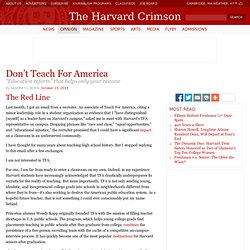
An associate of Teach For America, citing a minor leadership role in a student organization as evidence that I “have distinguished [myself] as a leader here on Harvard’s campus,” asked me to meet with Harvard’s TFA representative on campus. Dropping phrases like “race and class,” “equal opportunities,” and “educational injustice,” the recruiter promised that I could have a significant impact on a classroom in an underserved community.
I have thought for many years about teaching high school history. But I stopped replying to this email after a few exchanges. I am not interested in TFA. For one, I am far from ready to enter a classroom on my own. Princeton alumna Wendy Kopp originally founded TFA with the mission of filling teacher shortages in U.S. public schools. But it has become increasingly clear to anyone who thinks critically about teaching that there’s something off with TFA’s model. Teach for America: The Hidden Curriculum of Liberal Do-Gooders. Art by Loki Muthu The job of the American public school teacher has never been so thankless.
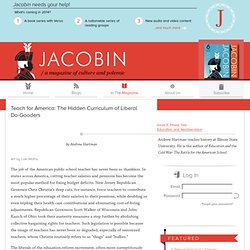
In states across America, cutting teacher salaries and pensions has become the most popular method for fixing budget deficits. New Jersey Republican Governor Chris Christie’s deep cuts, for instance, force teachers to contribute a much higher percentage of their salaries to their pensions, while doubling or even tripling their health care contributions and eliminating cost-of-living adjustments. Republican Governors Scott Walker of Wisconsin and John Kasich of Ohio took their austerity measures a step further by abolishing collective bargaining rights for teachers. Such legislation is possible because the image of teachers has never been so degraded, especially of unionized teachers, whom Christie routinely refers to as “thugs” and “bullies.”
The liberals of the education reform movement, often more surreptitiously than the overstated former Washington D.C. Rhee is adored in elite circles. An Open Letter to New Teach for America Recruits. Dear New TFA Recruits, It is summertime, which for those of you newly accepted into Teach for America, means you are enduring the long hard days of Institute. I congratulate you on being accepted into this prestigious program.
You clearly have demonstrated intelligence, passion, and leadership in order to make it this far. And now I am asking you to quit. Exacerbating Inequalities. CEHD Graduate Students against the Teach for America partnership. Teach for America’s Deep Bench. “Is this our Egypt moment?

Will we seize the moment?” Former New York City schools chancellor Joel Klein spoke those words at Teach for America’s 20th anniversary summit last summer. Coming from Klein, who is now a divisional leader at Rupert Murdoch’s News Corp, incitements to political uprising might raise some eyebrows. But at the summit for the nonprofit, which recruits college graduates to be teachers in poor school districts around the country, Klein was onto something that Nicholas Kristof and Thomas Friedman have ignored in their eight pro-TFA columns: behind the veil of well-funded, debate-worthy idealism, TFA is coordinating a political revolution. Since its founding, TFA has amassed some 28,000 alumni. What about the other 27,000-some-odd people?
LEE functions in part as a network for TFA alumni. The organization also provides resources for the electorally curious. “We provide various kinds of in-kind support,” he says. Advertisement. A Break in Teach for America’s Ranks. AP Photo/J Pat Carter Teach for America is at universities, recruiting high-achieving graduates to teach in the nation’s underserved urban and rural areas.
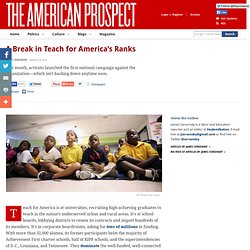
It's at school boards, lobbying districts to renew its contracts and import hundreds of its members. It's in corporate boardrooms, asking for tens of millions in funding. With more than 32,000 alumni, its former participants helm the majority of Achievement First charter schools, half of KIPP schools, and the superintendencies of D.C., Louisiana, and Tennessee. Students Resisting Teach for America Campaign. As many of you know, last November, myself and other incredible fellow students founded and launched our student-led initiative: Students United for Public Education (SUPE).
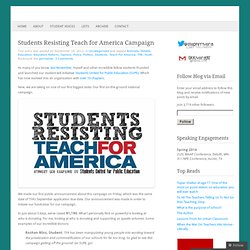
Which has now evolved into an organization with over 10 chapters. Now, we are taking on one of our first biggest tasks: Our first on-the-ground national campaign. I Quit Teach for America - Olivia Blanchard. I am sitting in a comfortable gold folding chair inside one of the many ballrooms at the Georgia International Convention Center.
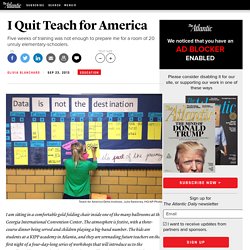
The atmosphere is festive, with a three-course dinner being served and children playing a big-band number. The kids are students at a KIPP academy in Atlanta, and they are serenading future teachers on the first night of a four-day-long series of workshops that will introduce us to the complicated language, rituals, and doctrines we will need to adopt as Teach for America "Corps Members. " The phrase closing the achievement gap is the cornerstone of TFA's general philosophy, public-relations messaging, and training sessions. As a member of the 2011 corps, I was told immediately and often that 1) the achievement gap is a pervasive example of inequality in America, and 2) it is our personal responsibility to close the achievement gap within our classrooms, which are microcosms of America's educational inequality.
Teach for America Apostates: a Primer of Alumni Resistance. (Image: Jared Rodriguez / Truthout ) Brianna stands beside the conductor's podium in the band hall of Chicago's Uplift High School.
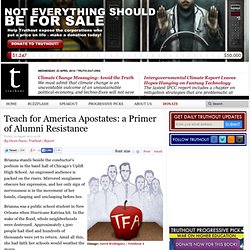
An engrossed audience is packed on the risers. Mirrored sunglasses obscure her expression, and her only sign of nervousness is in the movement of her hands, clasping and unclasping before her. Brianna was a public school student in New Orleans when Hurricane Katrina hit. In the wake of the flood, whole neighborhoods were destroyed. Approximately 1,300 people had died and hundreds of thousands were yet to return. Instead, she found that her school was one of the many consolidated into charter schools, which draw public funds but are privately managed. Brianna was vexed by her young new teachers, who were adversarial and fixated on data. Complicating matters, many of the new teachers in the majority-black district were white and unfamiliar with the community.
The students returned the teachers' animus. The summit didn't drop from the sky fully formed. Dr. T. Professor: Why Teach For America can’t recruit in my classroom. TFA founder Wendy Kopp Teach For America is an organization that recruits new college graduates, gives them five weeks of training in a summer institute and then places them in some of America’s neediest schools, with only a two-year commitment.
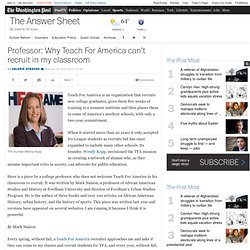
When it started more than 20 years it only accepted Ivy League students as recruits but has since expanded to include many other schools. Its founder, Wendy Kopp, envisioned the TFA mission as creating a network of alumni who, as they assume important roles in society, can advocate for public education. Teach For America’s ‘dirty little secret’ TFA critics organizing resistance at summit. A group of Teach for America alumni and students of TFA teachers who are critical of the organization are holding a summit this summer in an effort to organize against the organization that is popular with school reformers.
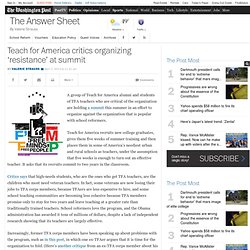
Teach for America recruits new college graduates, gives them five weeks of summer training and then places them in some of America’s neediest urban and rural schools as teachers, under the assumption that five weeks is enough to turn out an effective teacher. It asks that its recruits commit to two years in the classroom. Critics says that high-needs students, who are the ones who get TFA teachers, are the children who most need veteran teachers.